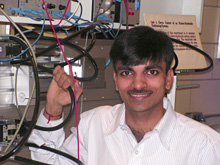
Girish Parvate-Patil shares his engine wizardry with others

Girish Parvate-Patil
He wants to be the number one engine expert in the world. Later this month, Girish Parvate-Patil will be one degree closer to just that.
The son of an Indian industrialist, Parvate-Patil came to Concordia in 2001 after discovering that there was active research here on his favourite subject: variable valve timing (VVT). Since then, he has had an unbroken string of successes in his own research, all while maintaining an excellent academic record.
The 28-year-old’s interest lies in using solenoids to open and close engine valves. Traditionally, valves are opened and closed by pressure created by rising and falling pistons, but there is a great deal of energy lost in the process. By using solenoids, there is less resistance for the pistons, and more energy left over to power the vehicle.
Parvate-Patil’s goal has been to measure the energy loss and potential benefits of switching to the VVT system. One groundbreaking piece of work involved proving an energy loss in diesel engines, which are usually considered to be very efficient.
In 2002 Parvate-Patil was recognized for his research and academic record when he was awarded the $4,100 Norman D. Hébert Master’s Fellowship. In turn, he took some of that money and set up three scholarships for students at his old college in Kolhapur, India.
In September 2003 he presented his research at conferences in Madison, Wis., and Tampa, Fla., and was honoured when a panel of engineering experts judged two of his papers to be among the most outstanding of 2003-2004. They were eventually published in the Journal of Engines (SAE).
Parvate-Patil is currently working for Engine Systems Development Center Inc as a project engineer. He sees his research as a way to do his share.
“When you do research you put in your ideas,” he said. “You’re contributing to society.”
Parvate-Patil attributes his interest in engines to his exposure as a youngster to the machines in his father’s factories. “It’s in my blood,” he said. He receives his Master’s in Mechanical Engineering on June 14.
- Robert Carver